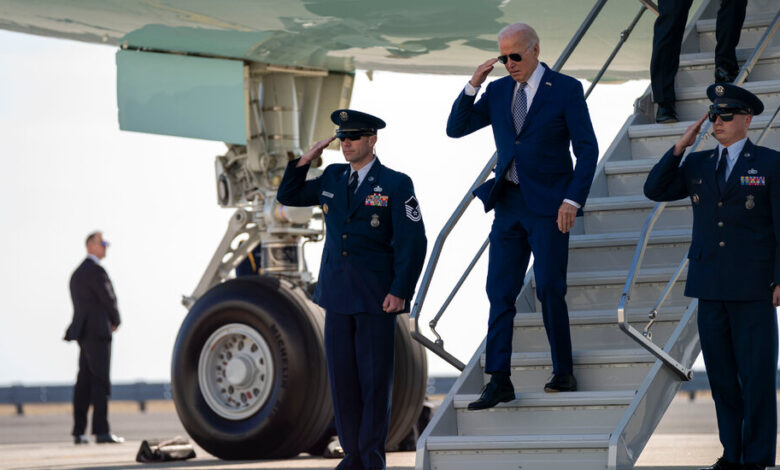Biden Says He’s Hopeful for Gaza Cease-Fire Within a Week

President Biden said on Monday that he believed negotiators were nearing an agreement that would halt Israel’s military operations in Gaza within a week in exchange for the release of at least some of the more than 100 hostages being held by Hamas.
Speaking with reporters during a stop in New York, Mr. Biden offered the most hopeful assessment of the hostage talks by any major figure in many days, suggesting that the war might be close to a major turning point.
“I hope by the end of the weekend,” he said when asked by reporters when he expected a cease-fire to begin. “My national security adviser tells me that we’re close. We’re close. We’re not done yet. My hope is by next Monday, we’ll have a cease-fire.”
The president delivered the comments spontaneously in response to questions during a visit to an ice cream shop after taping a segment on Seth Meyers’s late-night talk show. They came amid an active period of talks in the region, as Israel’s war cabinet over the weekend approved the broad terms of a deal that would involve a six-week truce for the release of about 40 hostages. An Israeli delegation is expected to meet in Qatar with intermediaries from the United States, Egypt and Qatar.
An agreement for a lengthy cease-fire timed to start with the beginning of the Muslim holy month of Ramadan next week would halt the Israeli bombardment in the Gaza Strip, which has killed many thousands of Palestinians and created a humanitarian crisis. It could also provide an opening for a surge in humanitarian assistance into Gaza, where food, water, electricity and other basics are in short supply.
A negotiated deal would be a dramatic, and perhaps defining, moment in the nearly five-month-old Middle East conflict and could lead to the release of the six remaining American hostages, who were among more than 200 seized and taken to Gaza when Hamas attacked Israel on Oct. 7. About 1,200 people were killed in Israel.
It could also eventually mean freedom for dozens of other hostages still in captivity. Their families have been waging a pressure campaign in Israel and around the world to demand their release, even as Israel has responded to the Hamas attacks with a fierce ground and air assault.
Mr. Biden did not elaborate on Monday about the details of a cease-fire or about whether Prime Minister Benjamin Netanyahu of Israel had signed off on a deal. But the president’s assessment that one could be reached by the end of next weekend was the clearest indication of progress in several weeks.
In a separate interview on “Late Night With Seth Meyers” on NBC taped on Monday afternoon and aired early Tuesday morning, the president said a halt in hostilities could open the door to a broader realignment of the region that he has been working toward, with Arab states like Saudi Arabia recognizing Israel. But while he has been pushing Israel to accept a so-called two-state solution in which the Palestinians would get a nation of their own, he pulled back a bit by describing that as more of a long-term goal.
“If we get that temporary cease-fire, we’re going to be able to move in a direction where we can change the dynamic and not have a two-state solution immediately but a process to get to a two-state solution, a process to guarantee Israel’s security and the independence of the Palestinians,” he told Mr. Meyers.
While he again backed Israel’s right to defend itself after the Oct. 7 attack and called himself a Zionist as he has before, he pressed his argument that Israel needs to recalibrate its approach to minimize civilian casualties especially as it concentrates its operation in the southern Gaza city of Rafah.
“There are too many innocent people that are being killed,” he said. “And Israel has slowed down the attacks in Rafah. They have to. And they’ve made a commitment to me they’re going to see to it that there is ability to evacuate significant portions of Rafah before they go and take out the remainder of Hamas.”
He added that Israel could risk the remaining friendships it has in the international community if it does not change course. “They’re going to lose support from around the world,” he said. “And that is not in Israel’s interest.”
Mr. Netanyahu said on Sunday that Israeli forces would invade Rafah regardless of any cease-fire and hostage deal. “It has to be done,” he said. “Because total victory is our goal, and total victory is within reach.” But he conceded that if a cease-fire were agreed to, such an operation would be “delayed somewhat.”
For Mr. Biden, helping to orchestrate a lasting deal to halt the fighting could be a significant step toward addressing a difficult political vulnerability as he seeks a second term in the White House.
For months, Palestinian activists in the United States have been assailing Mr. Biden for what they view as his failure to do more to prevent civilian deaths in Gaza. Protesters have dogged the president at most of his public events in recent weeks, sometimes waving signs calling him “Genocide Joe.”
That anger is likely to be on display on Tuesday, when Democratic voters in Michigan go to the polls to make their choice for the party’s presidential nominee. Some activists in Michigan, which is home to many Palestinian Americans, have urged voters to protest Mr. Biden’s stance on Gaza by voting for “uncommitted” in the primary.
The timing of Mr. Biden’s response to an unprompted question by a reporter could undercut that effort and help the president show strength in the primary.
Efforts to secure an end to the fighting have been in the works since the early days of the war, though the president and his aides have repeatedly defended Israel’s responsibility to respond to the worst terrorist attack in its history.
At the same time, the administration has been under growing pressure to restrain Israel’s government in light of the rising death toll in Gaza, which Gazan health officials say now stands above 29,000, the majority of them civilians. In November, the United States helped broker a short pause in the fighting that led to the release of about 100 hostages. Israel’s military assault continued after the pause broke down over disagreements with Hamas.
In recent weeks, negotiators have expressed optimism that talks between the parties have been moving in the right direction. But the discussions were being held against a backdrop of threats from Mr. Netanyahu that the country’s forces were ready for a major assault on Rafah, in the southern part of Gaza.
More than a million civilians, many of whom fled Israel’s bombing in the north of Gaza, are gathered in Rafah, and humanitarian organizations warned that a major assault by Israel there could kill thousands more.
Mr. Biden talked with Mr. Netanyahu on Feb. 15, and White House officials said in a summary of the call that the two men “discussed ongoing hostage negotiations” and that the president “reaffirmed his commitment to working tirelessly to support the release of all hostages.”



